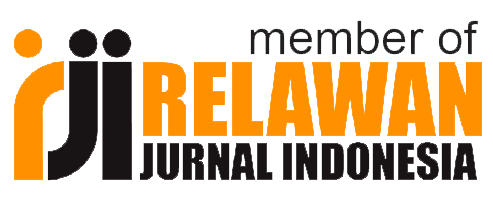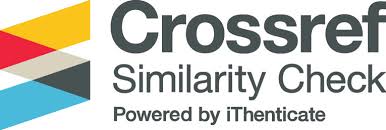INDEXED BY
Author Guideline
Submission Guidelines for Publication in Jurnal Farmasi Indonesia
Articles should be submitted through the online journal system (OJS). Each article submitted to the Indonesian Journal of Pharmacy incurs a fee of IDR 100,000. Articles deemed suitable for the scope of the Indonesian Journal of Pharmacy will undergo blind review by the Journal's Reviewers. Articles considered eligible for publication will be subject to a publication fee of IDR 250,000. Manuscripts accepted for publication are the result of selection and approval by the Editorial Board and have not been previously published in any other journal. All fees should be transferred to Mandiri Bank Account No. 1370018313276, under the name of Inaratul Rizkhy Hanifah. Authors are required to upload proof of payment via the link http://bit.ly/pembayaranjfi
Writing Guidelines: (You can download the template from the menu for easier article writing)
Writing Guidelines:
Interested in submitting to this journal? We recommend that you review the About the Journal page for the journal's section policies, as well as the Author Guidelines. Authors need to register with the journal prior to submitting or, if already registered, can simply log in and begin the five-step process.
For research involving human subjects or human data, whether intervention or non-intervention studies, a scanned copy of ethical approval from the research ethics committee is mandatory, and the EC number must be included in the manuscript.
Writing Guidelines: (You can download the template from the menu for easier article writing)
General Manuscript Guidelines:
The maximum length of a manuscript is 15 pages, written in single spacing and justified alignment. Manuscripts should use A4 paper size (210 x 297 mm), with top margin of 4 cm, right and left margins of 3 cm, and bottom margin of 3.5 cm. Header and footer margins are set at 15 mm and 13 mm respectively. Paragraph indentation should be applied. All foreign terms should be italicized.
Writing Guidelines:
Manuscripts should be written in Indonesian and/or English, following this sequence:
Title
The title must be effective, specific, clear (reflecting the content), novel, and engaging. The title should be written in both Indonesian and English (Cambria 14, Capitalize Each Word, single spacing, bold).
Author Names
First author1,*, Second author, etc. (full name without titles)
1 Institution
* Correspondence address: author's contact information including institution, address (optional), phone number (optional), city, country, email (Cambria 8, Capitalize Each Word, single spacing).
Abstract (Cambria 10, bold, single spacing)
The abstract is written in both Indonesian and English and should be a single paragraph providing comprehensive information about the objective, novelty, clear methodology, and not exceeding 200 words. The abstract should begin with the sentence "The novelty of this research is..." (Cambria 10, single spacing).
Keywords
Keywords consist of 3-5 words separated by commas (;) (Cambria 10, single spacing).
Introduction (Cambria 12, bold, single spacing, 6pt before line spacing)
The introduction should cover background, objectives, research gap, novelty, and urgency of the conducted research. The introduction should highlight the novelty and the position of this research compared to existing studies (Cambria 12, single spacing).
Research Methods (Cambria 12, bold, single spacing, 6pt before line spacing)
The research methods section includes the type of research, materials and instruments (with specifications and brands used), complete analysis methods (mention the method name if it's established without modification, or provide detailed information if modifications are made), method citation/license, and method novelty. Sub-sections are allowed (Cambria 12, bold, single spacing) based on the sequence of the used methods. Sub-sections should not be numbered (Cambria 12, single spacing).
Results (Cambria 12, bold, single spacing, 6pt before line spacing)
Results are presented according to the sequence outlined in the methods. Sub-sections are allowed (Cambria 12, bold, single spacing) based on the sequence of the used methods. Results must be presented clearly with appropriate parameters, in the order defined by the methodology, with clear results, and presented attractively. Tables, graphs, curves, and images should follow the article template (Cambria 12, single spacing).
Discussion (Cambria 12, bold, single spacing, 6pt before line spacing)
The discussion should interpret the obtained results logically, clearly, and in depth. It should be relevant to the results, compare with similar articles, highlight novel findings, discuss limitations, and provide research recommendations. It should be well-structured, addressing the research problem based on the background and research methods (Cambria 12, single spacing).
Conclusion (Cambria 12, bold, single spacing, 6pt before line spacing)
The conclusion should be clear, relevant to the objectives, informative, consistent with the results, and not exceed 50 words (Cambria 12, single spacing).
Acknowledgments (Cambria 12, bold, single spacing, 6pt before line spacing)
Include thanks to funding sources and collaborating institutions (Cambria 12, single spacing).
References (Cambria 12, bold, single spacing, 6pt before line spacing)
Use proper citation style, relevant and quality references, a minimum of 15 references, with over 80% being primary references (last 10 years) and at least 8 references from reputable international sources. Citations and references follow IEEE style and should include DOIs for each article (Cambria 12, single spacing).
Note: Authors who do not respond to manuscript revisions within 6 months will result in automatic rejection of the manuscript.












